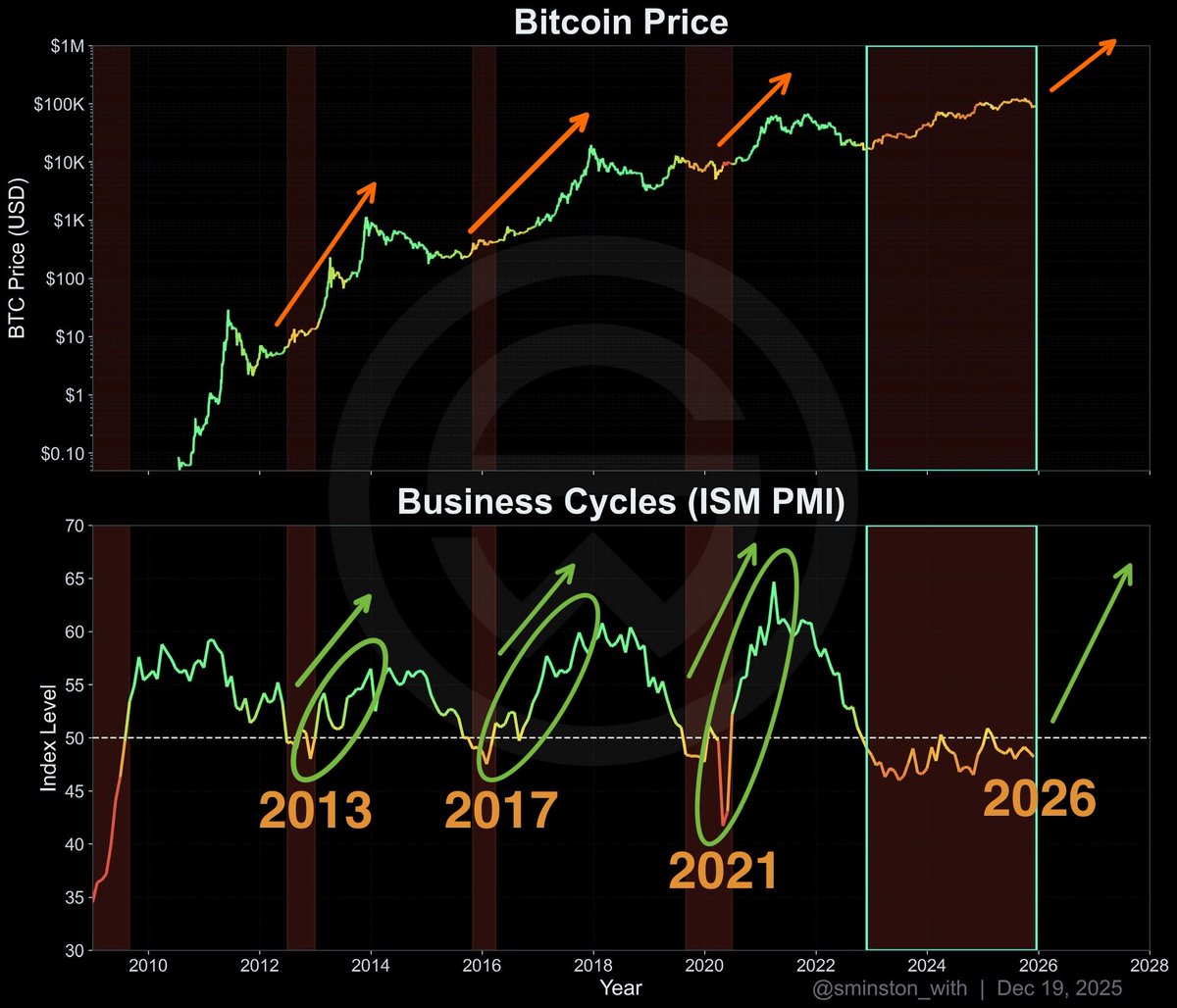Topic Background

Blockchain scanner
Crypto Newbie
1d ago
🔔US Manufacturing PMI Surpasses 50 for First Time in Three Years, Analysts Divided on Bitcoin's Future Direction
According to Mars Finance, the US ISM Manufacturing PMI surpassed 50 in January, ending its contractionary trend throughout 2025 and reaching its highest level since 2022. Andre Dragosch, Head of European Research at Bitwise, stated that the surge in PMI data aligns with the reflation trading logic, and such macroeconomic environments have historically been associated with Bitcoin bull markets. Michaël van de Poppe stated that the PMI returning above 50 signifies the end of a long-term bear market, and he expects the cryptocurrency market to experience its final bull run over the next 1 to 3 years. Titan of Crypto, however, noted that while Bitcoin rallied after the PMI rose above 50 in 2013, 2016, and 2020, the current PMI shows a bearish divergence from Bitcoin prices, suggesting the outcome may be different this time.

Bitcoin News
Crypto Newbie
1d ago
The ISM Manufacturing Index has rebounded strongly, potentially boosting Bitcoin's prospects.
The ISM Manufacturing Index just recorded 52.6, far exceeding the expected 48.5.
This is a huge surprise.
Reasons why the ISM Index is expected to continue rising until 2026:
New Orders Pace:
The new orders index surged to 57.1 in January, the highest level since early 2022. This leading indicator suggests strong market demand sufficient to support production levels for the next few quarters.
AI Agents Boosting Productivity:
Manufacturers are increasingly moving from pilot projects to full-scale deployment of autonomous AI agents to manage supply chains and shift changes. This "supercycle" of technology investment is improving operational flexibility and freeing up previously idle production capacity.
Supportive Industrial Policies:
New tax incentives and the continued repatriation of semiconductor and green energy hardware are driving a long-term capital expenditure boom, enabling the industrial sector to maintain structural growth.
The ISM PMI index has been steadily climbing for nearly three years and has just decisively jumped into expansion territory.
December: 47.9
January: 52.6
This marks a strong economic return to growth after 26 consecutive months below the neutral threshold of 50.0.
Historically, when the PMI index jumps from a deep contraction to above 52.5, the growth momentum tends to continue.
Research by @sminston_with indicates that the last time such a significant recovery occurred, the Bitcoin bull market peaked approximately 10 to 11 months later.
Closely monitor the continued economic expansion in 2026 and the trend of Bitcoin's "liquidity-driven" price action being highly correlated with historical data.
For more ISM/Bitcoin charts, follow @sminston_with.

Blockchain scanner
Crypto Newbie
02-01 17:17
🔔 "Sister Wood": BTC, ETH, Solana, and HYPE as Diversified Investment Options
According to Mars Finance, on February 1st, Cathie Wood, CEO of asset investment management company ARK Invest, responded to investors' questions about "confusion regarding investment direction after the gold price correction," stating, "Contrary to the current mainstream view, (I personally believe) Bitcoin, Ethereum, Solana, and HYPE may be good diversified investment options. Since the beginning of 2020, the correlation between Bitcoin and gold prices has been very low, at only 0.14. In the past two Bitcoin bull markets, gold led the rise in Bitcoin."


Blockchain scanner
Crypto Newbie
02-01 09:24
🔔Cathie Wood: Bitcoin's Correlation with Gold Remains Low; Investing in BTC, ETH, Solana, etc. is Recommended
According to Mars Finance, Cathie Wood, founder of ARK Invest, stated on the X platform that, contrary to current mainstream opinion, BTC, ETH, Solana, and Hyperliquid may be good choices for diversification. Since the beginning of 2020, the correlation between Bitcoin and gold prices has remained very low, at only 0.14. Gold has outperformed Bitcoin in the past two Bitcoin bull markets.


吴说区块链
Binance
02-01 09:13
According to Wu, Cathie Wood, founder of ARK Invest, stated that contrary to current consensus, BTC, ETH, Solana, and even Hyperliquid may be good diversification tools. Since the beginning of 2020, the correlation between Bitcoin and gold prices has been very low, at only 0.14. Gold has outperformed Bitcoin in the last two major Bitcoin bull markets.


cryptogems555
Crypto Newbie
02-01 00:20
🚨 2026 Bitcoin Bull Market Prediction: Bookmark this page! 🔮
Based on classic cycles, the following is the bull market pattern:
- February: Accumulation Period – Savvy investors quietly buy in.
- March: Bitcoin Rise – Bitcoin prices surge, market optimism soars.
- April: Altcoin Season – Altcoin prices skyrocket, market sentiment peaks.
- May: Bull Trap – False pullbacks cause prices to fall, the market begins to lower its guard.
- June: Liquidation Period – Panic selling plunges the market into despair.
- July: Bear Market – Capitulation selling, the market bottoms out.
For informational purposes only and does not constitute investment advice. A $245,000 top? Don't be fooled!
Check back in six months. 🔖
#Bitcoin #Cryptocurrency


cryptogems555
Crypto Newbie
01-31 16:14
🚨 2026 Bitcoin Bull Market Prediction: Bookmark this page! 🔮
Based on classic cycles, the following is the bull market pattern:
- February: Accumulation Period – Savvy investors quietly buy in.
- March: Bitcoin Rise – Bitcoin prices surge, market optimism soars.
- April: Altcoin Season – Altcoin prices skyrocket, market sentiment peaks.
- May: Bull Trap – False pullbacks cause prices to fall, the market begins to lower its guard.
- June: Liquidation Period – Panic selling plunges the market into despair.
- July: Bear Market – Capitulation selling, the market bottoms out.
For informational purposes only and does not constitute investment advice. A $245,000 top? Don't be fooled!
Check back in six months. 🔖
#Bitcoin #Cryptocurrency

Quinten | 048.eth
Crypto Newbie
01-31 01:29
The Chicago Purchasing Managers Index (PMI) is 54.
The ISM Index reflects the US business cycle.
A reading above 50 indicates expansion.
A reading below 50 indicates contraction.
Every Bitcoin bull market has coincided with a rise in the ISM Index.
It is not a so-called "four-year cycle."
